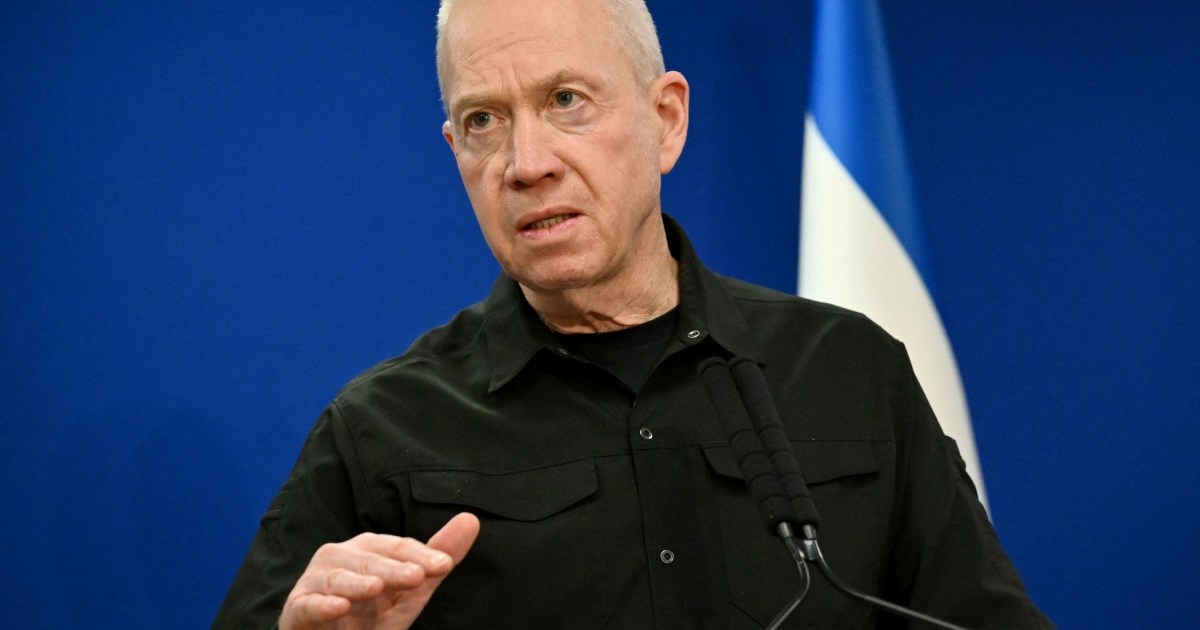Israeli defence minister outlines new phase in Gaza war
Israeli Defence Minister Yoav Gallant has outlined Israel’s plans for the next phase of its assault on the besieged Gaza Strip and future scenarios for the day after the war ends.
“In the northern region of the Gaza strip, we will transition to a new combat approach in accordance with military achievements on the ground,” Gallant’s office said in a statement it said outlined the guiding principles reflecting Gallant’s vision for the next phases of the war on Thursday.
He said operations would include raids, demolishing tunnels, air and ground strikes, and special forces operations.
In the south of the besieged enclave – where most of Gaza’s 2.3 million population is now living, many in tents and other temporary shelters – the operation would continue to try to eliminate Hamas leaders and rescue Israeli hostages.
“It will continue for as long as is deemed necessary,” the statement said.
Israel launched its offensive in Gaza following the October 7 attack by Hamas gunmen who killed some 1,140 people in communities near Gaza and took around 240 into captivity as hostages, according to Israeli estimates.
Israel’s war on Gaza has killed more than 22,400 people, according to Palestinian health authorities, and has forced most of the population out of their homes and reduced much of Gaza to rubble.
After the war
Gallant also outlined Israel’s plans for Gaza after the war. He said Hamas would no longer control Gaza and Israel would reserve its operational freedom of action. But he said there would be no Israeli civilian presence and Palestinian bodies would be in charge of the enclave.
“Gaza residents are Palestinian, therefore Palestinian bodies will be in charge, with the condition that there will be no hostile actions or threats against the State of Israel,” Gallant’s office said in a statement on Thursday.
Al Jazeera’s Sara Khairat, reporting from Tel Aviv, said Gallant made it clear that Israeli officials want a “Palestinian entity” to be in charge of running civilian affairs in the Gaza Strip, but with “very specific conditions”.
“Those conditions are that they won’t act hostile towards Israel, and they won’t act against it in any way, shape, or form,” Khairat said.
Israel has repeatedly said that there is “no place” for Hamas in the post-war civilian structures of Gaza. Several Israeli officials, including far-right finance Minister Bezalel Smotrich, have also said Israel will permanently control the Gaza Strip and possibly resettle Israelis there.
Gallant also said that Israel will have “complete freedom to military operations in Gaza”, Khairat said.
“This is something we’ve been seeing in the occupied West Bank” she noted.
‘Multi-national task force’
As part of a so-called restructuring, Israel also intends to establish a “multi-national task force that comprises … Western and Arab nations”, Gallant told reporters. The force, Khairat said, will look to govern the border area.
Israel wants to lead the force, and wants it to be in charge of the restructuring and redeveloping of the Gaza Strip, she said.
“Egypt, Israel, and the US are working together to guarantee tight supervision of that border,” Khairat added.
Gallant said this is one of many potential plans that officials will be discussing in upcoming meetings.
Meanwhile, Hamas is gaining popularity across the occupied Palestinian territories. It governs Gaza and has the backing of several other Palestinian factions. The group has repeatedly said it will remain steadfast and voiced its refusal to leave the territory.
Hamas fighters continue to battle Israeli ground troops in central Gaza and parts of southern Gaza.
Military operations in the south continued on Thursday, despite the area previously being declared by the Israeli army as “safe” after it forced thousands of Palestinian families to flee their homes in the north, east, and central Gaza.
Many of the displaced are now crammed inside the Rafah governorate in southern Gaza. The health ministry has warned that disease there is spreading amid a lack of supplies, medicine, clean water and much-needed fuel.
The United Nations says nearly 1.9 million people have now been displaced – more than 80 percent of the Gaza Strip’s pre-war population.




